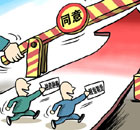Society
Travelers make final stretch for reunions
By He Na (China Daily)
Updated: 2010-02-12 07:20
 |
Large Medium Small |
Soon a girl dressed in yellow with pigtails in her hair stopped in front of him and stared up at his face. "Jingjing, it's you. I'm back. Your father is back from Beijing," Li cried excitedly, holding out the doll he had brought her as a gift.
His daughter's face turned red and she squeezed out the quietest "Dad?" before lowering her head, tears dripping onto her shoes. They walked home in silence, Jingjing a few steps behind her father with her hands tightly clutching her new doll.
"My father calls home twice a week. He asks me about my studies and if I have been listening to my mother," said the girl in a strong Henan accent. "I have several classmates whose fathers also work far away. I am used to this life, and I prefer this to those kids whose parents both work outside the town. I am much happier."
Jingjing's certificates of merit line the walls in the family home. "She studies very well and I hope to send her to the university in the future," said Li. The girl also helps her mother in the kitchen and with cleaning after class. "My mother is too tired. I like father coming back because he can help her with the housework," she added.
During the brief reunion lunch, Li constantly put food in his children's bowls. "Have more," he kept urging them. "The foods we often have on the construction site are steamed buns, soup, potatoes and cabbage. Meat is rare."
Although they are farmers, Li and Zhang's land does not produce enough to feed the family. They own just 2 mu (0.1 hectare) of land, on which grows corn and rice.
"With the soaring prices of seeds and fertilizers, our yearly income after toiling on the fields is just 2,000 yuan," said Li.
Thousands of young farmers find it hard to eke out a living from their land and must move to cities in search of extra cash. Li is no longer a farmer in the traditional sense and going home for Lunar New Year is more like a holiday for him. He returns once or twice a year, often staying for only a few days.
"Construction workers in Beijing have to work under the baking sun in summer and sleep in cold huts in winter. But each month I get 1,500 yuan, which is my entire annual income in the village," he said.
Like many villages and small towns, most of the year only women, children and the elderly can be found in Nanhedian. The town only comes to life at Spring Festival.
When Jingjing returned to school after lunch, Li bought a large barrel of soya oil, sunflower seeds and cakes from a nearby grocer in preparation for a visit to his in-laws in the next town, which is a 30-minute motorbike ride away.
"I remember when I was young I had to ride half a day to the next town by bike on a mud road. Now even the poorest family has a motorbike, so getting around is much more convenient," said Zhang.
The freezing winters, however, have not improved. As homes south of the Yangtze River do not have central heating, it is still common to see families in yards circling fires made of tree branches and hay.
Zhang's parents were playing poker in the yard when she arrived with Li and Chenchen. Her aging father quickly lit some branches in a metal bin and stood six small chairs around it, while her mother brought out sweet potatoes.
Li's father-in-law is over 60 years old but still worked on construction sites in Beijing until last year. "I am too old for that kind of work now," said the grandfather as he added more branches to the fire.
As they ate, Li told his attentive audience about the changes in the capital during the last year. His parents-in-law invited the family to have dinner - or as people in Henan call it, "eat soup" - but Li declined. It was getting dark and the winding country roads have no street lamps, so he wanted to return home.
The couple collected Jingjing from school and the family enjoyed dinner in a small noodle shop close to their home.
"Most of the workers on my site are young people and I'm probably one of the oldest ones there," said Li as he began to ponder his return to Beijing. "The children are still young and I need to earn more money if we want to send them to college. I have more than 10 years' experience in construction and have learned a lot in Beijing. I hope to one day become a boss myself and organize my own construction teams."
About 4 million laborers migrate to Beijing from across the country every year to work in various fields, according to the National Bureau of Statistics. The majority spend less than one month with their families.
Li will leave shortly after Spring Festival. He does not know when he will return next.







